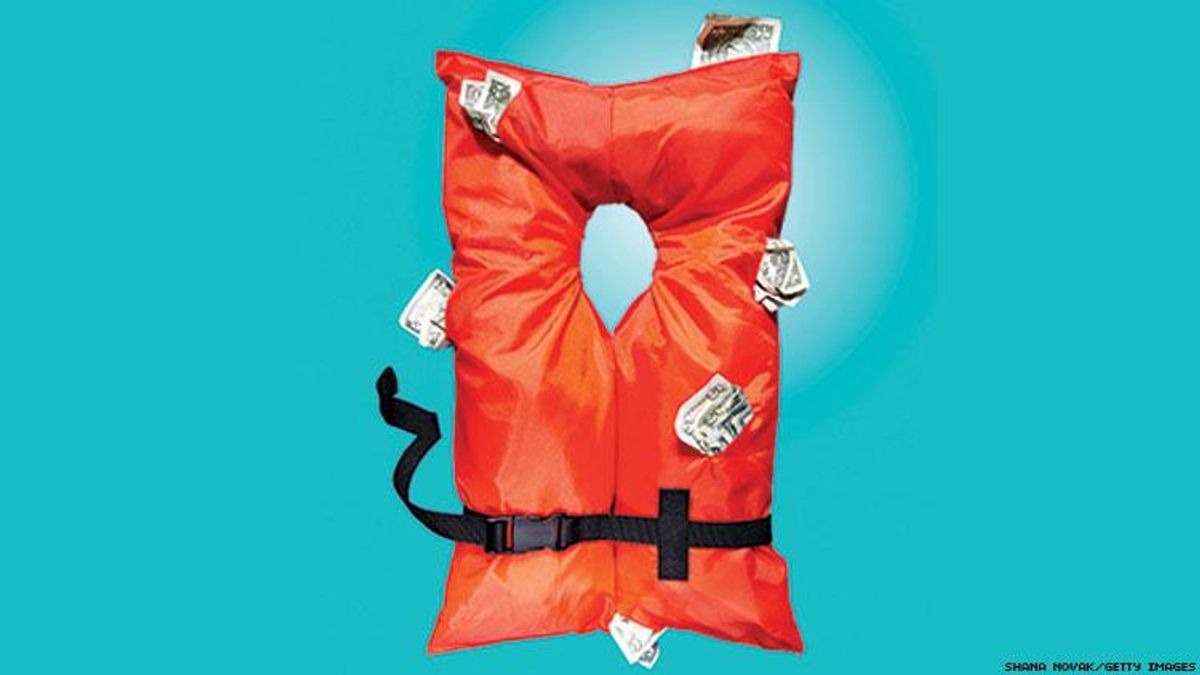Print
An LGBTQ+ Guide to Surviving High Inflation

Rising prices and inflation are slamming LGBTQ+ consumers and businesses alike. Here's how to ride out the storm.
January 14 2023 7:00 AM EST
May 31 2023 2:49 PM EST
By continuing to use our site, you agree to our Private Policy and Terms of Use.

Rising prices and inflation are slamming LGBTQ+ consumers and businesses alike. Here's how to ride out the storm.
It's not just you: Living in America is expensive AF these days.
Inflation reached a 40-year high in 2022, squeezing some consumers to the point of discomfort and beyond. The cash crunch disproportionately impacts LGBTQ+ people, who are more likely to experience poverty, unemployment, food insecurity, and homelessness, according to research conducted by the Williams Institute at the University of California, Los Angeles. Thanks to record-breaking spikes in the cost of living, queer consumers and business owners alike are feeling the pocketbook pain.
"It's just insane how much prices have gone up," says Erin Vesey, chef and owner of Detroit Vesey's, a community-centered cycling cafe in downtown Los Angeles. But they say the price of goods hasn't stopped loyal customers from continuing to visit local LGBTQ+ establishments just yet. "I think people want to come in and support, and make sure queer spaces continue to exist through any kind of pitfalls in society."
Nearly every category of spending is feeling the pressure. Flight prices alone were up 42 percent over a 12-month period. As queer people are forced to tighten their belts, efforts to make and save enough money can lead to higher stress, social isolation, or both. Some segments of the LGBTQ+ community are more at risk than others.
LGBTQ+ Elders Are Especially Vulnerable
One-third of LGBTQ+ older adults live at or below 200 percent of the federal poverty level, says Christina DaCosta, senior director of marketing and communications at SAGE, a national advocacy and services organization. For 2022, 200 percent of the poverty level in the United States was $27,180, according to the Department of Health and Human Services.
"Any increase in basic cost of living can dramatically impact older members of our community," she says. "Due to a lifetime of discrimination, LGBTQ+ elders have had so many socioeconomic disadvantages compared to their straight cis peers." In 2020, SAGE released a free financial wellness app, SAGECents, to help LGBTQ+ elders and others shore up their financial literacy. More than half of SAGECents users have reduced their debt by at least $200, and 42 percent have improved their credit scores by 25 points or more, according to a recent press release.
"Managing inflation has been challenging," writes one SAGECents user. "My electricity bill has increased 2.5 times what it was a year ago. I'm concerned, but I can't walk around in the dark."
The price increases stem from inflation but also corporate greed. The cost of electricity is up 14.1 percent in the last 12 months, according to the Bureau of Labor Statistics' Consumer Price Index for October 2022. Yet energy companies and other corporations are announcing record profit hauls, deflecting the burdens of inflation back onto the consumer.
The Rise of "Pink Money"
Inflation threatens to stunt what is otherwise a rising tide of LGBTQ+ economic power. "Pink money" refers to the purchasing power of the queer community, and with Generation Z reporting LGBTQ+ identification in record numbers -- over one in five, according to the most recent Gallup poll -- this purchasing power will rise dramatically in coming years.
The LGBTQ+ community is now the fastest-growing minority segment in America with regard to purchasing power, and it's important we learn how to manage the money we have. Financial literacy takes time to build, and can be unglamorous at times, but it'll help you better navigate your money when times get tough.
Money Tips for Riding Out the Inflation Wave
When you're struggling to make ends meet, money can be a never-ending source of stress. Here are some tips to stay the course when finances are tight.
1. Resist "financial nihilism"
Between record student loan balances and rising debt burdens, many queer people are tuning personal finance out. What's another pair of shoes when you're already six figures in the hole? Challenge yourself to keep an eye on your money: how to make it, save it, and spend it in a way that supports you.
2. Leave budget shame at the door
Ain't no shame in being honest about your money game. Resist the urge to live above your means in order to maintain a social status or keep up a facade. Pick up a side hustle, invite friends over for an inexpensive movie night, or take some time to confront your spending habits and make tweaks.
3. Find and support LGBTQ-focused businesses
It's more important than ever that we spend our dollars with LGBTQ-owned businesses and the people who run them. "Supporting queer businesses is super important," says Vesey. "I have a lot of folks not understanding why having queer spaces, spaces that center other folks, is important. Showing up, supporting them, and making sure they're around, it's a lifesaving thing."
Cost-of-living spikes will persist for several more months at a minimum, and it's important that we as queer people continue to look out for one another.
"Getting old is a privilege, especially in our community," says DaCosta. "Preparing for your financial future is important."
Nick Wolny is an entrepreneur, speaker, and senior editor at NextAdvisor, in partnership with Time. He focuses on the intersection of LGBTQ+ life and personal finance, and has previously contributed to Fast Company, Business Insider, and Entrepreneur Magazine. Join his newsletter at NickWolny.com.
This article is part of Out's January/February 2023 issue, out on newsstands February 7. Support queer media and subscribe -- or download the issue through Amazon, Kindle, Nook, or Apple News.
Beware of the Straightors: 'The Traitors' bros vs. the women and gays